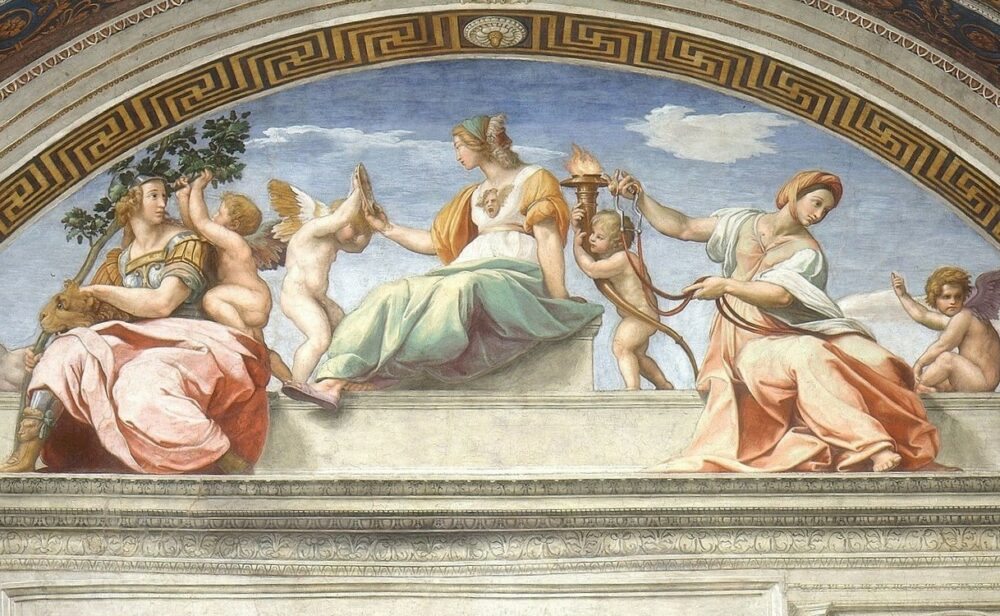
None of us are born temperate….
When you or I struggle with a moral decision, we might consider whether it falls under a rule, like the Golden Rule or the Ten Commandments, or if it will produce better rather than worse results.
Our North American culture, preoccupied with machines and automation, procedures and measurement, prefers these approaches, as each of them hopes to make morality something easy, almost automatic.
The Catholic tradition has a place for considering both rules and outcomes, but its focus, so far as morality is concerned, is something called “virtue.” Virtue is not a word we ordinarily use. It can sound like a piece of jargon. Yet in my experience, once we see what it is, we can see it in the nitty-gritty of everyday life.
Virtue is another word for excellence. When we think about a virtuous person, it is a bit like thinking about a virtuous axe or a virtuous sock. An excellent axe — a virtuous axe-— is sharp and easy to wield. An excellent sock — a virtuous sock — is warm, comfortable, and long lasting. What would count as an excellent human being?
That might look like a trick question. Axes and socks are useful. Humans matter in their own right — not just when or because they are useful. Yet humans do have a purpose: happiness. And for Catholics, happiness is holiness, friendship with God. An excellent human being, then, is one who is well-equipped for friendship with God.
If we have enough money, we can buy an excellent axe or excellent socks. But human virtues can’t be bought. They must be practiced. The natural virtues include temperance, courage, justice, generosity, and prudence.
Consider temperance: the virtue of moderating our appetites so that they serve health and flourishing rather than leading us to dissolution or misery. None of us are born temperate. We might, left to ourselves, pursue our desires for food, drink, and sex to the point of self-destruction.
To live temperately is to be rooted in habits and disciplines, hard-won over time, and in light of some understanding of why we live this way.
In the best case, we practice habits of virtue because we admire someone virtuous. We walk in the footsteps of those we want to be like: parents, teachers, heroes from real-life or literature.
But many of us come from broken places, where we admired the wrong sort of person or where we were never taught the discipline we needed to live out our ideals. However, the understanding that guides our habits does not require a blessed childhood.
We all know that recovering addicts are capable of building new ways of life. Their suffering teaches them how much they need temperance. They come to see that their happiness depends on it.
The Greek philosophers Plato and Aristotle, from whom the Church received much of its teaching about virtue, understood the importance of good habits, good laws, and good models. Yet they knew these conditions were rare.
They did not believe in a personal God who cared for us as individuals or who intervened in our lives. As a result, their philosophy has a dark side. Their beautiful ideals of life, as they saw it, could only belong to a few.
“Who will rescue me from this body of death?” St Paul cries in the letter to the Romans. His cry is the cry of his own inadequacy, the inadequacy of all human beings to be good and holy. We know the answer St. Paul finds: it is the grace of Jesus Christ that rescues us.
As Christians see it, a loving God may intervene with special graces in order to help us get on the right track. Anyone who has been to an Alcoholics Anonymous meeting has heard testimony to this effect.
But Christianity also offers us new and higher forms of excellence, the virtues of faith, hope, and charity. These virtues are also built-in habits, but their origin is the act of grace given in our baptism.
It is thanks to our baptism that we are able to believe and to trust in God’s goodness (faith), to hope for eternal life for ourselves and for others (hope), and to love God and our neighbor above all things (charity).
Yet, of course, the grace of baptism is nurtured by our daily choices. If we lose the habits of faith, hope, and love, the habits of prayer, sacraments, and service, we risk losing our grip on our understanding of where our happiness and salvation lie.
A virtuous action is beautiful. When I was at Madonna House, I remember watching one of the nurses change the dressing on a particularly disgusting wound I had at one time. She showed no sign of disgust, but treated my oozing leg as if she were a sacristan preparing the altar for Mass.
I remember a staff member in a field house who would quickly and quietly switch the chairs around the table before every meal, so that another member with back problems could sit in the most comfortable chair. Anyone who has spent time at Madonna House has seen someone pick up an extra duty cheerfully and without complaint.
Catherine Doherty taught that who we are matters much more than what we do. She meant, I think, just this: that our desire for happiness with God, fed by the little actions in our daily lives, our habits and our dreams, is by far the most important thing. We can misuse rules and become preoccupied with results, but if our hearts remain open to God, nothing, as St Paul says, can separate us from him.
Zena Hitz is a former staff member who now teaches at St John’s College in Annapolis MD.
[image: Cardinal and Theological Virtues by Raphael, Vatican Museums.]




